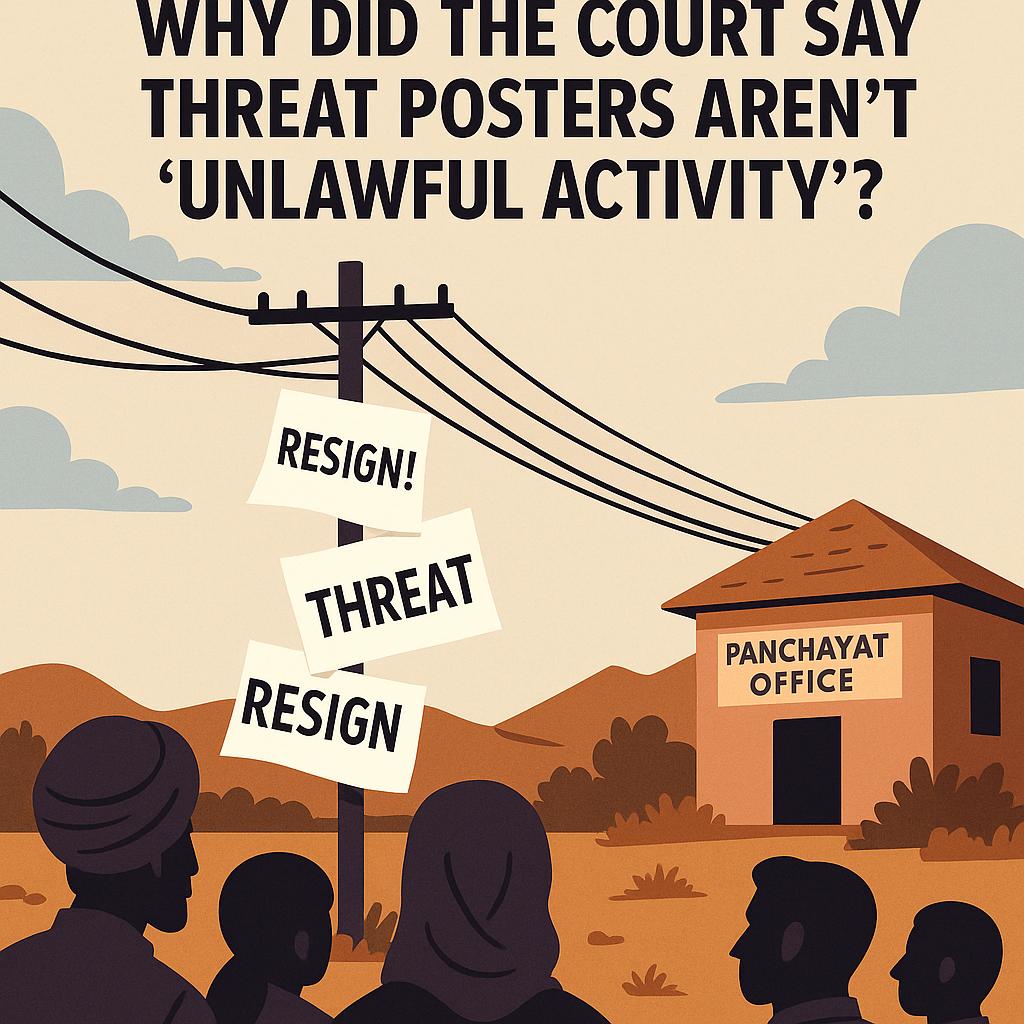Introduction
Can a mere poster containing threats be treated as an “unlawful activity” under India’s toughest anti-terror law? The Jammu & Kashmir and Ladakh High Court has answered this in the negative, ruling that affixing such posters however intimidating does not fall within the legal definition of an “unlawful activity” under the Unlawful Activities (Prevention) Act, 1967 (UAPA). Back on July 31, 2025, the Jammu & Kashmir and Ladakh High Court’s Division Bench put a stop to the Union Territory’s effort to reverse Ghulam Mohammad Lone’s acquittal. Their ruling gave a clearer picture of the boundaries of Section 13 under the UAPA.
UAPA Case Background: Threat Posters to Panchayat Members
This dispute traces back to 2012, when Anantnag police booked a case under Section 13 after threat posters appeared on electric poles, warning Panchayat members to quit or face “dire consequences.” Investigators linked them to the banned Hizbul Mujahideen.
Lone and four others were taken into custody for questioning. In front of an Executive Magistrate, police collected Lone’s handwriting samples, which the Forensic Science Laboratory said matched the posters. But in February 2024, the trial court threw the case out, saying the evidence didn’t measure up.
High Court on the Scope of ‘Unlawful Activity’ Under UAPA
When the UT challenged that acquittal, Justices Sanjeev Kumar and Sanjay Parihar honed in on the definition in Section 2(o) of UAPA. For an action to meet that bar, it has to push for one of three things:
- breaking away Indian territory,
- damaging the country’s sovereignty or territorial integrity, or
- stirring disaffection against India.
The Court observed that the posters merely sought to intimidate elected Panchayat members into resigning. “Such words… cannot be said to disrupt the sovereignty and territorial integrity of India,” the judgment noted, ruling out their classification as an “unlawful activity” under the Act.
Evidentiary Gaps in the UAPA Prosecution
Let’s talk about the holes in the prosecution case. Three important witnesses suddenly changed their stance, and another denied making any statements during official questioning. Other than the forensic lab expert saying the handwriting matched Lone’s, there simply wasn’t strong proof that he actually wrote or put up the threatening posters.
Referring to these gaps, the Bench held that the UAPA charge was unsustainable. It added that while the act could have invited charges under the Ranbir Penal Code (RPC), remanding the matter now would be unjust, given that the accused had already faced trial for over eight years.
UAPA Jurisprudence and the Court’s Reasoning
The verdict now sits alongside other rulings that urge courts not to stretch UAPA’s language beyond its intended reach. Back in 2021, in the well-known K.A. Najeeb v. Union of India case, the Supreme Court made a point that still resonates: personal liberty needs to be guarded closely, all the more when the evidence is shaky and the trial seems never-ending. Building on that same idea, the J&K High Court made it clear that simply scaring or threatening someone isn’t the same thing as terrorism.
Implications Beyond This UAPA Case
The judges didn’t mince words they stressed that keeping this line intact is the only way to make sure UAPA stays focused on tackling real terror threats, rather than spilling over into the territory of routine policing.
Conclusion
In UT of J&K v. Gh. Mohammad Lone, the High Court’s takeaway was hard to miss laws with this kind of reach don’t belong in ordinary cases and should be pulled out only for the rarest, most exceptional ones. Put simply, follow what the law actually says, avoid pushing its limits, and don’t forget: in a democracy, protecting freedom matters every bit as much as protecting security.
Author Information:
By Karthikeyan Ganesan, a law student from KKC College of Law, reporting on law and technology for Nyayasphere. Karthikeyan always likes to stay updated with current trends and important information regarding the law and cases across the country.

